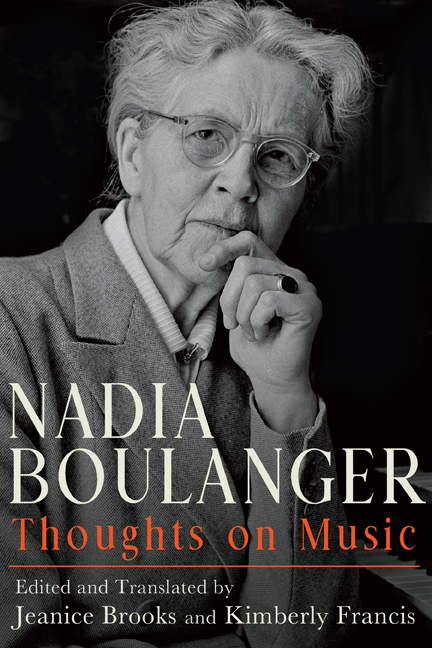Book contents
- Frontmatter
- Contents
- List of Illustrations
- Acknowledgments
- Editorial Apparatus and Critical Notes
- Note on Translations
- List of Abbreviations
- Timeline of Nadia Boulanger’s Life
- Introduction
- Part One Journalism, Criticism, Tributes
- Part Two Lectures, Classes, Broadcasts
- Bibliography of Nadia Boulanger’s Published Writing
- General Bibliography
- Index
Lecture for the British Broadcasting Corporation, “Introductory Talk to Series of Recitals of French Choral Music by Mademoiselle Nadia Boulanger,” November 16, 1936 (original English text)
Published online by Cambridge University Press: 15 October 2020
- Frontmatter
- Contents
- List of Illustrations
- Acknowledgments
- Editorial Apparatus and Critical Notes
- Note on Translations
- List of Abbreviations
- Timeline of Nadia Boulanger’s Life
- Introduction
- Part One Journalism, Criticism, Tributes
- Part Two Lectures, Classes, Broadcasts
- Bibliography of Nadia Boulanger’s Published Writing
- General Bibliography
- Index
Summary
In asking me to introduce the five recitals of French Vocal Ensemble Music, the BBC gave me a wonderful and terrible privilege: wonderful because he who has had a purpose likes to define it; terrible because Music, who speaks for herself so convincingly, becomes, when one tries to translate her power into words, the most volatile, intangible element.
What have we tried to do? How have we done it? The purpose was to give an idea of the different aspects vocal ensemble music has had and still has in France, what it has meant and means. What it has been, and is, as a medium of expression.
In order to succeed, was it necessary to follow a chronological order? At first one would say so, but considering the question from another angle, we came to another conclusion, and that for two reasons: the first, if built in successive periods, each recital would only let appear one isolated part of the ensemble we had the purpose to display in its entirety: the second, certainly the more important, refers to the real relationship in art; in looking for it, one makes associations which seem at first strange to the mind, but are clear to the deeper understanding.
For instance, some modern painting is infinitely nearer to the fourteenth century than to a painting of fifty years ago. In accordance with this point of view, the intention of these five recitals is to present five pictures, independent in appearance, connected in fact, each giving an idea of the whole, which however is only realized when the five images have been seen. In building these programmes, we were intending to illustrate the way in which a certain character or human type continually reappears throughout the ages, different in clothing, different in manner, different in language, but expressing a same thought, a same aspiration, a same emotion. These programmes include music from the twelfth and thirteenth centuries, with its purity, its economy, its wisdom, its amazing fluid transparency.
First an anonymous sequence from the twelfth century: “Verbum Bonum.”
Then a part of a Motet of Perotin, who was organist at Notre-Dame of Paris in the early twelfth century.
- Type
- Chapter
- Information
- Nadia BoulangerThoughts on Music, pp. 409 - 413Publisher: Boydell & BrewerPrint publication year: 2020



